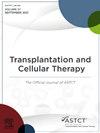Melphalan Dose in Combination With Fludarabine Affects Gastrointestinal Toxicity and Graft-Versus-Host Disease After Allogeneic Transplantation in Acute Myeloid Leukemia and Myelodysplastic Syndromes
IF 3.6
3区 医学
Q2 HEMATOLOGY
引用次数: 0
Abstract
Fludarabine (Flu) and melphalan (Mel) reduced-intensity conditioning is frequently used for allogenic hematopoietic cell transplant (allo-HCT) in patients with acute myeloid leukemia (AML) and myelodysplastic syndromes (MDS). However, there is limited evidence on the impact of Mel dosing on toxicities and clinical outcomes of allo-HCT. We retrospectively compared 8/8 HLA-matched donor allo-HCT outcomes of 345 patients with AML or MDS receiving total Mel dose of 100 mg/m2 (Mel-100, n = 62) versus 140 mg/m2 (Mel-140, n = 283) in combination with Flu. Median age at allo-HCT was 66 years and median follow-up was 36.5 months. For Mel-100 versus Mel-140 groups, any grade gastrointestinal (GI) toxicity rates were 40.3% versus 67.8% (P < .001), day 100 grade II to IV acute graft-versus-host disease (GVHD) rates were 21.0% versus 43.1% (P = .001) and 2-year chronic GVHD rates were 17.4% versus 27.1% (P = .033). In multivariable analysis, Mel-140 resulted in higher risks of GI toxicity (HR = 1.83, P = .013), grade II to IV acute GVHD (HR=2.35, P = .003), and moderate/severe chronic GVHD (HR = 3.13, P = .007). Total Mel dose had no independent impact on oral mucositis, nonrelapse mortality, relapse, relapse-free survival, and overall survival. While independent validation of our observation is warranted, our findings support using Mel-100 in combination with Flu to minimize allo-HCT toxicities and morbidities related to GVHD.
美法仑剂量与氟达拉滨联用对急性髓性白血病和骨髓增生异常综合征异基因移植后消化道毒性和GVHD的影响
在急性髓性白血病(AML)和骨髓增生异常综合征(MDS)患者的异基因造血细胞移植(allo-HCT)中,经常使用氟达拉滨(Flu)和美法仑(Melphalan)减量调节疗法。然而,关于梅尔剂量对异基因造血干细胞移植毒性和临床结果的影响,目前证据有限。我们回顾性比较了345例接受Mel总剂量100 mg/m2(Mel-100,n=62)与140 mg/m2(Mel-140,n=283)联合Flu治疗的AML或MDS患者的8/8 HLA匹配供体同种异体HCT疗效。异体血细胞移植时的中位年龄为66岁,中位随访时间为36.5个月。Mel-100组与Mel-140组的任何级别胃肠道毒性发生率分别为40.3%和67.8%(P<0.05)。
本文章由计算机程序翻译,如有差异,请以英文原文为准。
求助全文
约1分钟内获得全文
求助全文
来源期刊

Transplantation and Cellular Therapy
Medicine-Hematology
CiteScore
7.00
自引率
15.60%
发文量
1061
审稿时长
51 days
 求助内容:
求助内容: 应助结果提醒方式:
应助结果提醒方式:


